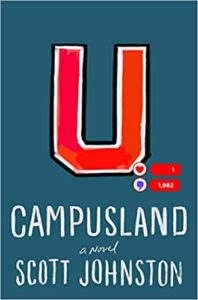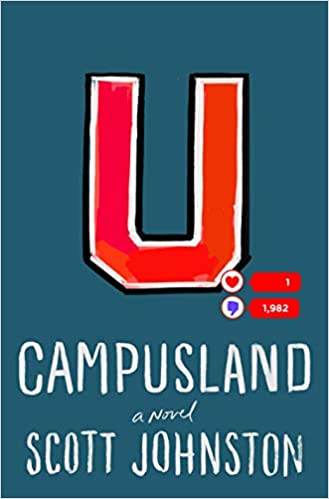
I rarely read a whole 300+ page novel in a day, but I did so on Saturday. It’s Campusland by Scott Johnston. Johnston, who worked at Salomon and opened some nightclubs in New York, also founded two tech start-ups. But those are not what the book’s about. It’s about Ephraim Russell, a young assistant professor of American literature who teaches at fictitious Devon University, a small elite private university with a multi-billion dollar endowment. Russell is up for tenure but, while trying to teach Adventures of Huckleberry Finn, gets caught in the buzzsaw of phony charges of racism. Later he gets charged with coming on sexually to a precocious 18-year old freshman (excuse me, I shouldn’t have said “man:” I mean “first-year.)
There are so many things to like about the book. It took about 40 pages for me to get into it but once I was, I wanted to know what happens. Even though much of what transpires seems overdone, one can believe that this kind of thing can happen in a Title IX, “Dear Colleague” universe. If you don’t know what I’m referring to, look it up or, better yet, read the book.
Johnston is quite good at examining the motives and incentives of the various players who try to get Professor Russell in hot water. Each motivation seems plausible.
One passage in particular is worth reporting in an economics blog, the unintended, but believable, consequences of changes in laws, in particular the law on drinking. One of Ronald Reagan’s worst domestic policy mess-ups was his signing a federal law to raise the drinking age to 21. (It doesn’t compare with his ratcheting up of the war on drugs but it’s pretty bad.) The stick Reagan and Congress used for states that didn’t comply was a threat to withhold highway funds.
Johnston doesn’t mention Reagan but he does lay out some unintended consequences of the law. Here are a few.
Effect on Fraternities
Despite determined efforts over many decades by Devon administrators, fraternities remained a part of the school ecosystem. There was a time, back in the 1970s, when the administrators had almost succeeded in purging them, but then the drinking age was raised to twenty-one and off-campus fraternities sprouted like invasive weeds.
Effect on Size of Parties and Type of Alcohol Consumed
But big, campus-wide parties? Those were now a thing of the past. Students slithered into the nook and crannies, mainly dorm rooms and fraternities, consuming what they wanted behind closed doors where they wouldn’t be caught by RAs and other mandated busybodies. Beer, the college beverage of choice since the first student was forced to read Proust, faded away. Too bulky. No way to sneak a keg into your dorm. Vodka was the new poison, its primary virtue lying in its efficiency–a mere ounce was equivalent to a whole beer, so it was easy to sneak around, and it mixed with about anything.
Notice the solid economic reasoning above about the effect of illegalization on risk and therefore on relative prices.
Effect on Mixing of Demographic Groups
There were other, subtler consequences. Unintended ones. Social life became cliquey, balkanized. With the open-to-all, campus-wide parties gone, students now huddled in groups of six or ten or twelve. These groups had an irritating habit, from a progressive college administrators point of view, of self-selecting almost completely along demographic lines.
HT2 Jonathan Meer, for recommending the book.


READER COMMENTS
nobody.really
Jun 28 2021 at 11:51pm
My Episcopalian friend would speak of the prevalence of drinking among the scrum of adults at church youth events. Matthew 18:20 states that “Wherever two or three gather in my name, I will be with them.” But among the Wiskepalians, this became “Wherever four or more gather in my name, there will be a fifth.”
Vivian Darkbloom
Jun 29 2021 at 2:50am
From your link:
“After Prohibition, the total ban on alcohol, many states established a minimum legal drinking age of 21. But that began to change after the voting age was lowered to 18.”
That’s a rather incomplete and misleading statement. I remember quite clearly that the movement to lower both the voting age and the legal drinking age in the late sixties and early seventies was a result of the Vietnam War and the draft. The campaign was “if you are old enough to die for your country, you are old enough to vote and drink”. It was rather untenable to hold the drinking and voting age to 21 under those circumstances.
KevinDC
Jun 29 2021 at 9:22am
There was a similar set of incentives when I was in the Marines and living in the barracks. Having beer in the barracks was allowed, but underage drinking was not, and there were rules about who could have alcohol in their room and what type and how much. Marines under the age of 21 who were still inclined to drink (read: all of them) had to keep their booze hidden, and tended towards hard liquor for that reason. Much easier to stash away a pint of whiskey than a 12 pack of beer. It also had the effect of encouraging binge drinking – once you acquire some alcohol, the incentive is to drink it all as quickly as possible. That way, you minimize the amount of time there is booze in your room to be found. After all, they can’t find any of your alcohol in a surprise inspection tomorrow if you drink all of it tonight! So as incentives go, it was a perfect recipe to promote the binge drinking of hard liquor.
A tangential but related note – the Marine Corps’ drug policy also had the effect of encouraging the use of harder, more dangerous drugs. It was officially a “zero tolerance” policy – a failed drug test meant you were booted out, no exceptions. Doesn’t matter if you tested positive for heroine or for pot, same penalty. But, marijuana remains detectable far longer than most other drugs – if I remember correctly, it has something to do with the active component being stored in body fat, and it meant marijuana could be detected in a drug test upwards of a month after use. By contrast, cocaine is no longer detectable after two days. The penalty for using either was the same, but the risk of getting caught for cocaine was far lower – so the substitution effect did what the substitution effect does.
David Seltzer
Jun 29 2021 at 12:13pm
Kevin, I was stationed at NAS Corpus Christi, then Sangley Point in the PI. A number of underage sailors were admitted to sick bay with alcohol poisoning. They consumed bad whiskey in copious quantities in record time. I boxed in the inter-service tournaments for nearly three years. I used steroids during that period to enhance my performance. I suspect my trainers knew but looked the other way simply because they wanted to win.
MarkW
Jun 29 2021 at 10:03am
Another bit of widespread government stupidity that pushed college drinkers to switch from beer to hard liquor were keg registration laws. With those laws in place, the person who provides a keg for a college party can be identified and arrested, but of course there’s no easy way to identify whoever buys the cheap vodka for the ‘jungle juice’.
Comments are closed.